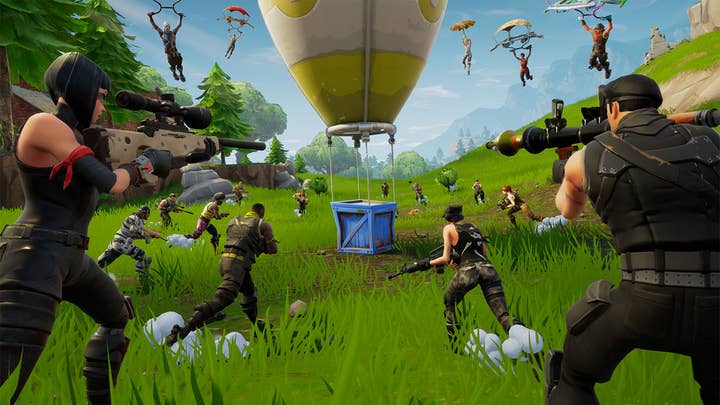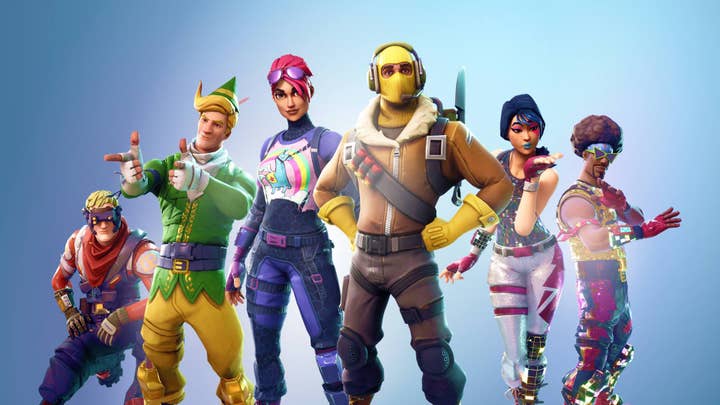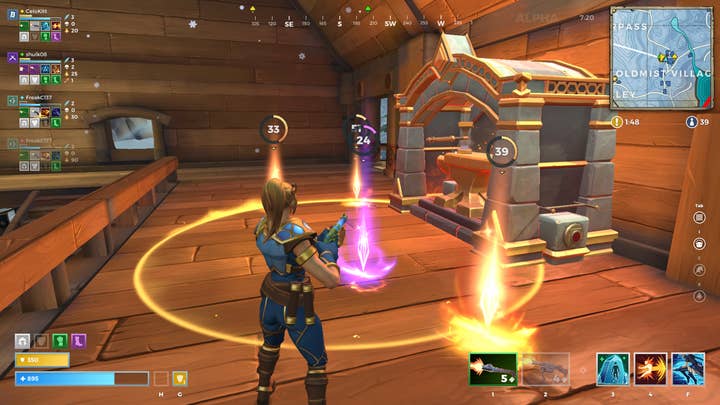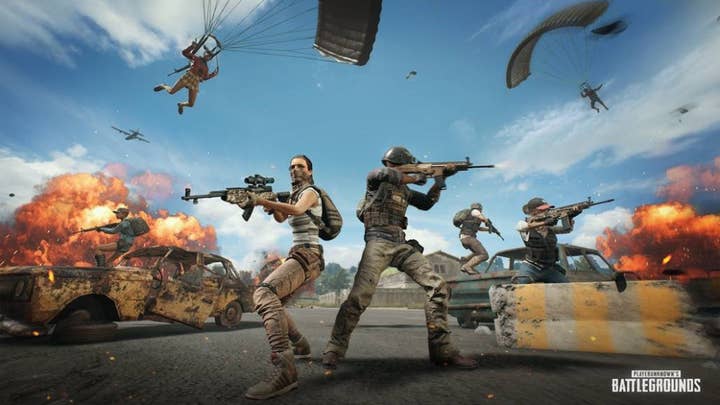Ten surprising things battle royale can teach us
Will Luton reflects on the lessons developers and publishers can learn from the rise of Fortnite, PUBG and their rivals
Battle royale's exponential rise has been the A plot for video games in 2018, with the gritty and complex PlayerUnknown's Battlegrounds and the slick, chiselled Fortnite in the leading roles.
While there's as many takes on the success of the genre as there are players, it is clear that the ascent is thanks in part to the irreverence the genre's key creators have show toward conventional industry wisdom. This justified impudence means there are a wealth of surprising lessons from the genre that will help us all make better games.
1. You Can Be Punishing
If someone would have told you that the breakout game of 2018 would see see you grind loot only to instantly die and lose everything in 99 out of 100 games, would you have believed them? Much of the beauty of the battle royale genre is in players facing punishing failings and being willing to jump back in.
The trend in design in the past decade has been in protecting the player from negative feedback. Perhaps the pinnacle of this thinking can be seen in Overwatch, where kill-death ratios are replaced with medals for a tangential actions such as time on the objective or healing done.
Meanwhile battle royale games slap you around the face and scream "you fucked up" over and over. Yet as these failures are so fair - after all, it's another player and not the game that killed you - they put the player on a skill progression path they're happy to follow through negative feedback alone. This harsh failure is reminiscent of the golden era of arcades and reminds us that it is okay to give a player an uncushioned fail condition. But only if the player can take a learning from their loss that will bring them back to play.

2. F2P Wins, Even In Core
One of the most interesting tales from battle royale's rise is in the fight for prominence between two games that took wildly different approaches: PlayerUnknown's Battlegrounds was a mid-priced title that was followed six months later by the free-to-play Fortnite. Despite being later to the market, Epic's game has emphatically won in terms of players and revenue.
While the power of free should now be obvious to anyone in the industry, it had seemed like the core PC and console market was a staunch holdout. While there are many factors that led to Fortnite's success, such as better accessibility and quality of execution (see 'Speed and Quality Matters'), the biggest contributor to Fortnite's growth was its lack of entry price: anyone could drag in any of their buddies to play with only the friction of a download. Having seen this dynamic at play in both League of Legends and Hearthstone, it's now clear that following a paid model in core PvP will at best leave you in second place.
3. Speed and Quality Matters
Secondary to price, Fortnite also trumped PUBG in another area: post-launch execution. PUBG is a marvel for a new team on a limited timescale, especially considering this was creative director Brendan Greene's first commercial game. Yet Fortnite was built upon more stable foundations, starting life as an existing game with a natural fit for a battle royale mode.
Epic were able to update more quickly and with greater focus on the things that mattered to players: gameplay variety and kickass cosmetics. Meanwhile, PUBG struggled with hefty machine requirements, niggling bugs, design debt, and muddy focus, leaving an annoyed and less evangelical fanbase. As such, PUBG suffered a comparatively weaker word of mouth growth than the slick and nimble Fortnite.
As games become more and more a service, a focus on quality of life, well directed improvement and live events is as important as any other marketing efforts. A well serviced game simply gets more players, but it also keeps them longer.

4. Cosmetics Can Take You to Top Grossing
In the early days of free-to-play, much talk around monetisation focused on hats and other trivial cosmetics, but as the market evolved we collectively concluded that convenience and competitive advantage were much stronger drivers. It was a great surprise when Fortnite became the first cosmetic-driven economy to maintain a top grossing position in the App Store.
However, there is something unique about battle royale games: each and every match, there is a ready-made audience of 100 players, each eager to differentiate themselves. Skins, then, become a way to signal a player's wealth and dedication, driving higher engagement and unprecedented levels of spend on vanity. In Fortnite, this monetisation desire is amplified by the clever Battle Pass system that, much like Clash Royale's chests, makes spending less like buying and more like releasing rewards for your own past efforts.
While Fortnite's spend per player is probably much lower than that of many of the more traditionally and aggressively monetised mobile games it has managed to open up a considerably larger audience.
5. The Mod Scene Is A Primordial Soup
At the turn of the decade, it seemed like the indie scene would be the source of a renewed creativity through the industry, bringing incredible new experiences and demographics to gaming. While that failed to pass, the amateur modding community has inadvertently stepped up: most notably with MOBA and now battle royale.
Freed from commercial expectations and emboldened by a hacker mentality, the mod scene has become the primordial soup of game genres. Many ideas, from sloppy to inspired, are experimented with: if a mod draws an audience then it gains more contributors or spin-offs, with the idea mutating and building. The first battle royale mod appeared in 2012 on top of Minecraft, taking five years to shape up to be what we know today through a handful of key contributors.
With such a diverse worldwide pool of creators that works so quickly and creatively within the mod scene today, and while the rest of us work in much smaller creative bounds, the future undoubtedly holds more genres sparked into existence by those thinking no further than "wouldn't it be cool if..."

6. Genre Evolution Is Rapid
Once a game hits, there's the inevitable rush of developer FOMO, triggering gamers to call copycat and pundits to decry a dearth of industry creativity. However, amongst this clammer and jibber jabber, it's easy to miss what is actually happening: the rapid evolution of a genre.
While battle royale has already seen six years of refinement from the mod scene, in the past few months alone we've seen interesting takes on the genre: Realm Royale introduced crafting and Totally Accurate Battlegrounds explores surrealist humour and experimental weapons. And there's more interesting takes coming that bring PvE and thousand-player matches or attempt to fit inside existing franchises. While most of these takes are likely to fail, they will do so finding the edges and helping to propel the genre to new, yet to be considered creative heights.
It's at times like these that it is worth remembering that as developers of the mid-nineties began to pioneer defining mechanics for what we now know as the first person shooter genre that their works were dubbed "Doom clones".
7. Cross Platform Is Now PC, Console and Mobile
Cross platform has traditionally referred to multiple console SKUs, perhaps with a later PC port. But in less than a year since launch, both PUBG and Fortnite have moved from PC and console to mobile with impressive success.
The consensus since the advent of touchscreen phones is that virtual controls are fiddly and inaccurate. But utilising the rapidly improving virtual controls from Chinese titles such as Arena of Valor, both Fortnite and PUBG have managed to make very playable mobile versions that have resulted in impressive financials.
Additionally, Fortnite's crossplay features now allows for players from any platform to group with and play against players on any other platform. This crumbles the traditional walled gardens of console generations past and means the lines between platforms are increasingly blurred. Epic are leading a charge to make platforms an irrelevant part of a players experience and it's a direction we should all follow.

8. Systemic Gameplay + Players = Stories
One of the most unique and exciting characteristics of battle royale is the ability for the games to create stories: Maybe in one match your team avoids enemy fire by backflipping a motorbike off a cliff and the next game you spend 20 minutes silently peeking out of a hut.
This story creation is achieved by putting lots of real players inside a game world packed with overlapping and intentionally flexible systems, resulting in what game designers call emergent behavior. Emergent behavior describes intended but unforeseen interactions between players and multiple game mechanics. There have been lots of deeply systemic games that give rise to emergent behavior - Dwarf Fortress being a classic example. However, battle royale games are the first time a systemic game has used a massively multiplayer environment effectively.
MMORPGs, while system-heavy, have players follow the questlines designers planned for them: the experience of any two players beating a raid is comparatively similar. Battle royale games break free of prescriptive paths by giving players space and an array of tools that can be used in conjunction with or against other players. The result is players having a sense of authorship and intrigue as the game plays out around them, but as a byproduct it also makes battle royale games very watchable.
9. The Power of Esports
While battle royale is something of an awkward esport due to the sheer number of players, the emergent stories makes for inherently interesting streaming, pushing both Fortnite and PUBG to the top of Twitch's most-streamed list.
With a daily audience of 15 million, Twitch has become a major resource for players to uncover a community as well as new games. And it's this free exposure that has allowed battle royale to grow so rapidly with little investment. Epic, knowing this, has written a huge love letter to streamers with a willy-waving $100 million prize pot. This investment is aimed at attracting the best esports teams, meaning more coverage, more hours streamed, more viewers and more Battle Pass purchases.
While it's hard to be sure if that $100 million is a wise investment, it indicates just how much is at stake in getting esports players and streamers to put a game in front of their audience and keep it there.
10. Gaming Is Now Pop Culture
From Drake on Twitch to the England's footballers flossing, the success of Fortnite has shown us that gaming is no longer a pop culture outsider. During the 'Pac-Mania' of the '80s to Lara Croft's brief stint of as an icon in the '90s, it always felt as if games were coming to mainstream culture as a passing novelty.
Fortnite, however, feels like the first time the wider media is addressing gaming on the same terms it would music, film, TV or the press. With each passing year, more game-natives reach leadership roles within media, bringing an understanding of gaming that is is reflected in the way their outlets discuss games. While there is still some scaremongering, there's also a great diversity in how Fortnite is reported. For example, the BBC covered Ninja's decision not to play with female streamers with an assumption of reader knowledge akin to any other celebrity news.
And there's good reason for the BBC to assume an audience's understanding: as of June, Fortnite had a player base of 125 million, a number equal to Netflix's worldwide subscriber count. Battle royale is a turning point where gaming did more than beat mainstream media in revenue but gained the same cultural validity.
Today, gaming isn't the reserve of a small niche demographic; it's an entertainment choice for as many people as watch movies or listen to music. Gaming is now pop culture.
Will Luton is a product director specialising in mobile free-to-play games and an industry consultant. He has worked with major firms such as Rovio, Sega, Jagex and Nexon.
